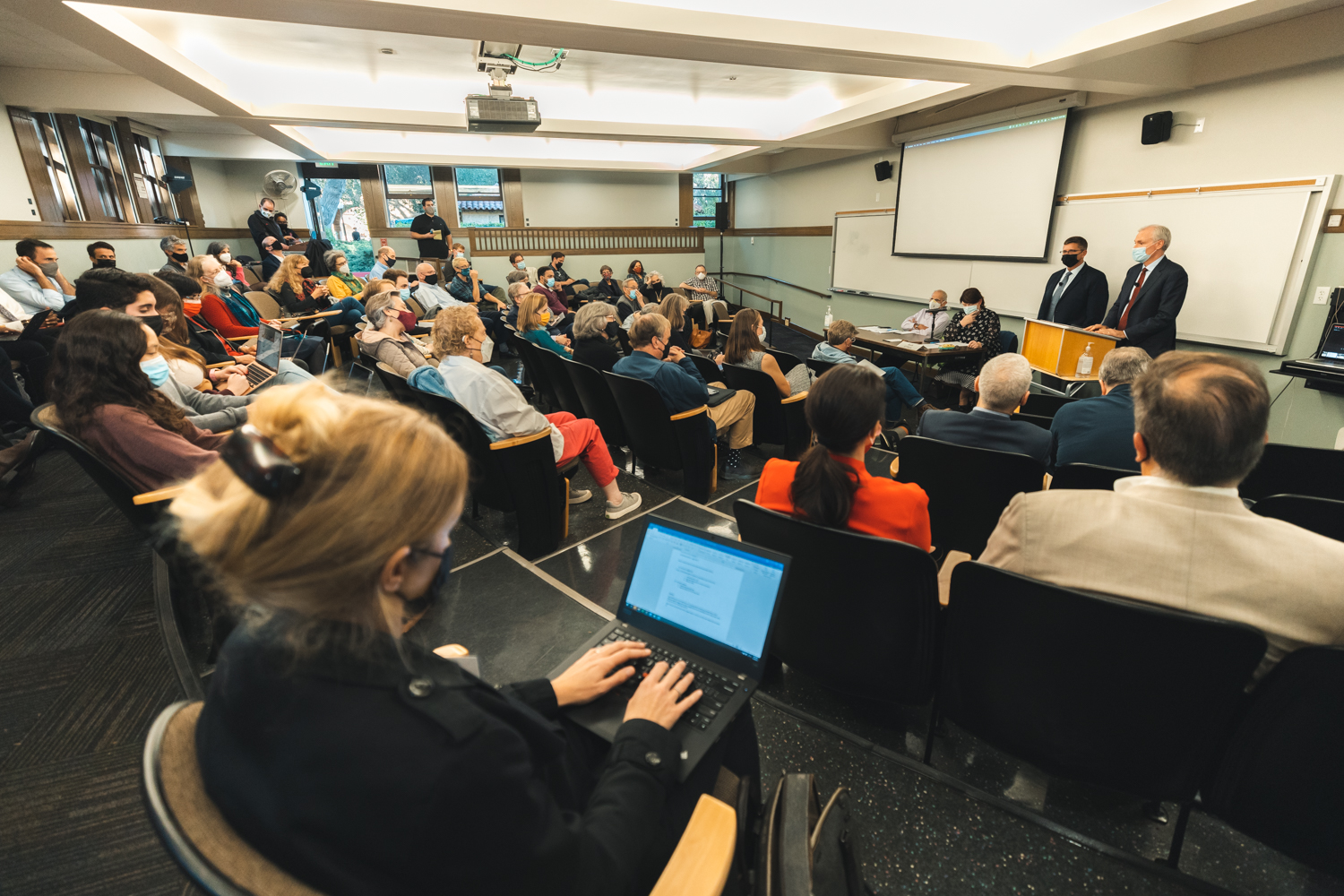In response to a report on campus security measures, members of the Faculty Senate cautioned against a recent decision by Stanford to increase video surveillance on campus. At its Thursday meeting, the Senate also raised concerns about undergraduates’ mental health, particularly among first-generation, low-income students.
Provost Persis Drell also highlighted a recent increase in COVID-19 cases on campus, noting that 288 students are in isolation and reiterating that masking will continue to be required in campus classrooms and on Marguerite buses until further notice.
The discussion surrounding on-campus video surveillance follows a report from the Committee on Academic Computing and Information Systems (C-ACIS) calling for standardized policies governing the usage and expansion of video camera surveillance on campus.
According to Mark Horowitz Ph.D. ’84, chair of C-ACIS and professor in the School of Engineering, 468 security cameras are currently operating throughout campus buildings, on top of an additional 359 cameras in the School of Medicine. Despite the high volume of cameras already installed, however, a “lack of camera coverage in public spaces,” is coinciding with growing concerns about auto and bicycle theft on campus.
The Stanford University Department of Public Safety, University IT, University Privacy Office, C-ACIS and students in CS 182: “Ethics, Public Policy, and Technological Change” contributed to the recommendations presented to the Senate. C-ASIS highlighted a number of Video Safety and Security Systems (VSSS) standards geared toward balancing the dual priorities of safety and privacy for members of the Stanford community.
“Cameras will not be installed where there is a reasonable expectation of privacy,” said Matthew Ricks, senior director of IT Facilities Infrastructure & Resilience. “They will not be in student living areas, student lounges, dining areas, restrooms, showers, locker rooms, those sorts of spaces.”
The presenters also underscored their support for proceeding with approved and funded VSSS projects, including pilot installations of cameras in the Wilbur Field Garage and outside of the entrances to student residences.
Despite the breadth of the research that went into the recommendations, the proposal drew sharp criticism from some members of the Senate, who expressed concerns about protecting the privacy of Stanford community members.
“The expansion of video surveillance is a terrible mistake,” said Philip Levis, a professor in the Computer Science and Electrical Engineering Departments who co-directed the Secure Internet of Things Project. “In narrow cases, with high-value assets, that’s fine, but once you record things, the cat’s out of the bag. They’re very open to abuse and misuse, and, in practice, video is not a deterrent to crime.”
Ricks emphasized that access to viewing the footage would be limited to a “very small group of authorized staff” and that signage requirements would be respected in areas where cameras are deployed. The University’s video surveillance will not employ facial recognition technology, but law enforcement may still implement such technology if it obtains footage through warrants or subpoenas.
Taking on mental health
The Senate also heard a report from Vice Provost for Undergraduate Education Sarah Church about the state of undergraduate education on campus. Church explained that the VPUE unit is “returning to full operation” and “transitioning out of pandemic response” with Bing Overseas Program campuses fully reopening and off-campus study and service opportunities also becoming accessible.
Mental health is “something that we really need to focus on,” Church added, pointing out that students have suffered in varying degrees amid the COVID-19 pandemic and remote learning. A joint VPUE-CAPS study on first-year students revealed “a real valorization of busyness and over-commitment at Stanford,” Church said.
She also expressed concerns about students’ reported fears about not getting high enough grades or selecting the optimal courses for their career goals.
“Lack of sleep is a badge of honor,” Church said, warning against student attitudes toward overwork. “Certainly our students absorb this culture, and I think it has a negative impact on student wellbeing.”
In an effort to better understand student academic pressures, a joint Faculty Senate committee has been organized to study the role of grading in the first year of undergraduate education. VPUE will also commit to supporting efforts related to the Inclusion, Equity, Diversity, and Access in a Learning Environment program, such as the Leland Scholars program, which helps first-generation, low-income undergraduates transition to college life.
“I wonder if we might consider that Stanford has a sort of selection bias in favor of students who both overcommit and who are able to effectively communicate their over commitment,” said mechanical engineering professor Juan Santiago. “And by this I mean overcommitment to academics, to social action, to extracurriculars, and, in some cases, athletics. So we shouldn’t be surprised as a university when we see that in our student body.”
